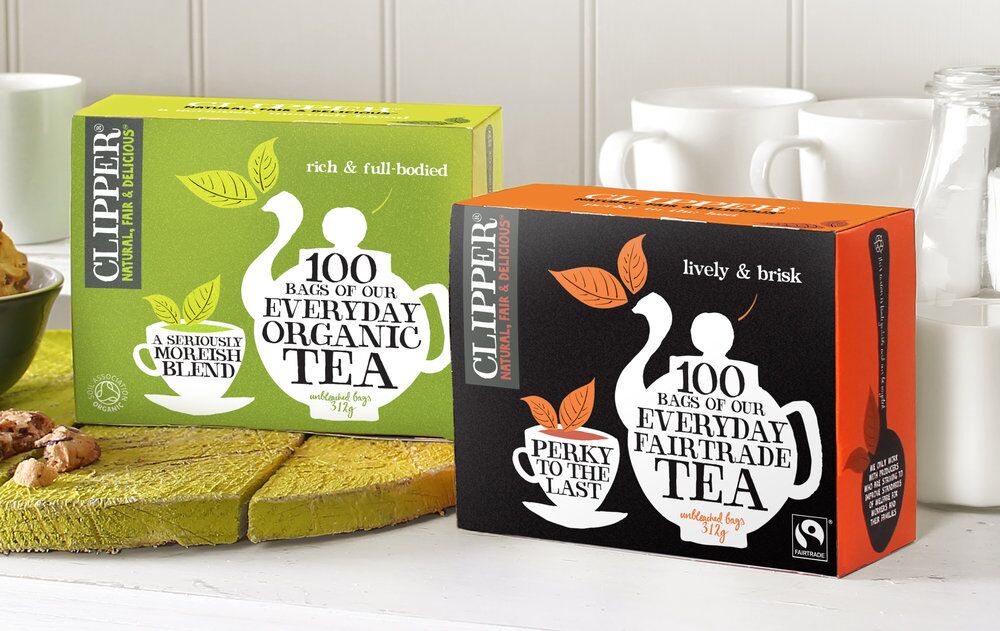 Clipper Teas, champion of the unbleached teabag, is the latest tea company to accede to customer demands to remove plastic from its tea bags. Despite supporting Fairtrade and ethical sourcing, Clipper Teas, like many other tea companies, has long used polypropylene, a plastic polymer, to seal its teabags.
It now joins PG Tips and U.K. grocery retail chain Co-op in committing to ditch the non-biodegradable seals.
“To help minimise our impact on the environment, our aim is to create a teabag paper made from all plant-based material. Not only will it be biodegradable, but it will remain unbleached and adhere to our organic principles,” said Adele Ward, brand controller at Clipper. The company is developing a new substrate that is GM free and 100% unbleached, and it expects to have “a plastic-free teabag in operation by the summer,” said Ward.
Brits drink six billion cups of tea each year, producing an estimated 150 tonnes of polypropylene from tea bags alone. “That’s an enormous amount of accumulated plastic waste that is either contaminating food waste compost collections or simply going to landfill,” said Co-op’s chief executive Jo Whitfield, announcing Co-op’s commitment to developing a plastic-free teabag this past January.
After Welsh gardener Michael Armitage started an online petition calling on Unilever to switch to plastic-free teabags in its PG Tips brand, which gathered more than 200,000 signatures, the company agreed to remove plastic from all of its tea bags by the end of 2018. The new plant-based material made from corn starch is 100 percent renewable and biodegradable and will not clog up green-fingered tea drinkers’ compost bins.
Armitage has since expanded his campaign, calling on Yorkshire Tea, Typhoo, Tetley, and Twinings to follow suit.
“There have been many campaigns to keep plastics and microplastics out of our seas, highlighting the harm they do to marine life. But the same is true of plastics on land as they can cause harm to birds and small mammals. We need to keep ALL plastics OUT of our environment,” writes Armitage.
His campaign has so far received more than 127,000 signatures in two months.
Twinings recently announced it is “actively developing and trialling fully biodegradable tea bags,” while Yorkshire Tea and Tetley confirmed they are looking at removing plastic from teabags. Yorkshire tea hopes to make the switch after the end of trials in June, reports The Guardian.
Sources: The Guardian, The Telegraph, Climate Action, World Tea News
Clipper Teas, champion of the unbleached teabag, is the latest tea company to accede to customer demands to remove plastic from its tea bags. Despite supporting Fairtrade and ethical sourcing, Clipper Teas, like many other tea companies, has long used polypropylene, a plastic polymer, to seal its teabags.
It now joins PG Tips and U.K. grocery retail chain Co-op in committing to ditch the non-biodegradable seals.
“To help minimise our impact on the environment, our aim is to create a teabag paper made from all plant-based material. Not only will it be biodegradable, but it will remain unbleached and adhere to our organic principles,” said Adele Ward, brand controller at Clipper. The company is developing a new substrate that is GM free and 100% unbleached, and it expects to have “a plastic-free teabag in operation by the summer,” said Ward.
Brits drink six billion cups of tea each year, producing an estimated 150 tonnes of polypropylene from tea bags alone. “That’s an enormous amount of accumulated plastic waste that is either contaminating food waste compost collections or simply going to landfill,” said Co-op’s chief executive Jo Whitfield, announcing Co-op’s commitment to developing a plastic-free teabag this past January.
After Welsh gardener Michael Armitage started an online petition calling on Unilever to switch to plastic-free teabags in its PG Tips brand, which gathered more than 200,000 signatures, the company agreed to remove plastic from all of its tea bags by the end of 2018. The new plant-based material made from corn starch is 100 percent renewable and biodegradable and will not clog up green-fingered tea drinkers’ compost bins.
Armitage has since expanded his campaign, calling on Yorkshire Tea, Typhoo, Tetley, and Twinings to follow suit.
“There have been many campaigns to keep plastics and microplastics out of our seas, highlighting the harm they do to marine life. But the same is true of plastics on land as they can cause harm to birds and small mammals. We need to keep ALL plastics OUT of our environment,” writes Armitage.
His campaign has so far received more than 127,000 signatures in two months.
Twinings recently announced it is “actively developing and trialling fully biodegradable tea bags,” while Yorkshire Tea and Tetley confirmed they are looking at removing plastic from teabags. Yorkshire tea hopes to make the switch after the end of trials in June, reports The Guardian.
Sources: The Guardian, The Telegraph, Climate Action, World Tea News
